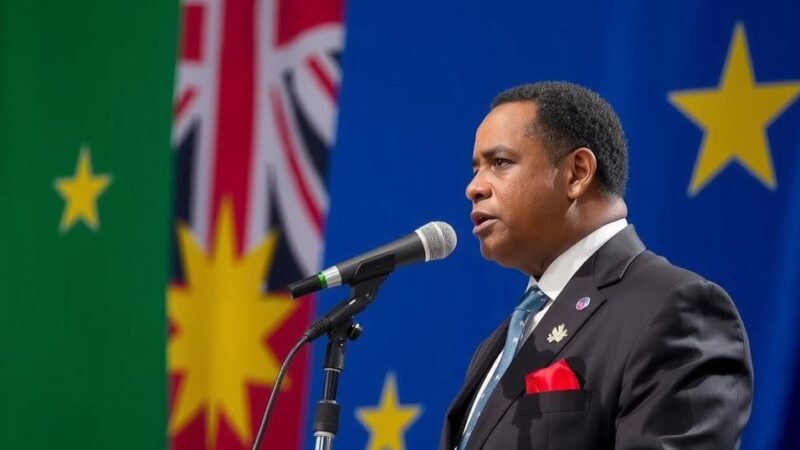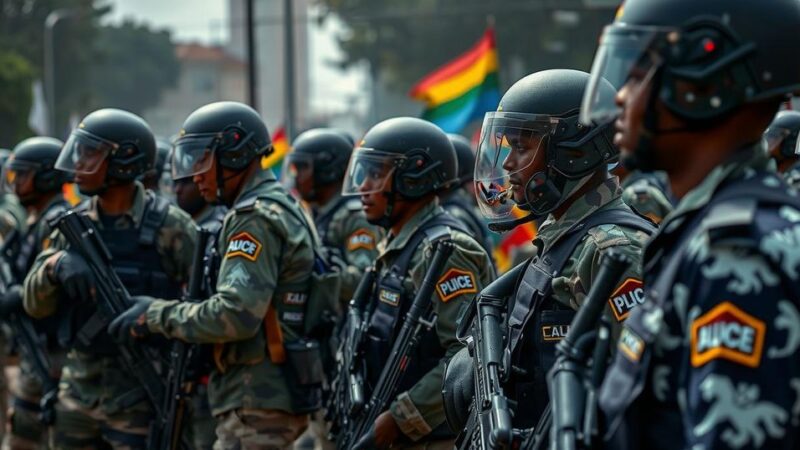Suriname’s President Chandrikapersad Santokhi, speaking at the UN General Assembly, urged the international community to reject “Haiti fatigue” and increase support for Haiti amidst its ongoing crises. He praised CARICOM’s efforts in establishing a transitional government and highlighted the need for financial and technological assistance. Additionally, he called for an end to the U.S. embargo on Cuba and underscored the challenges faced by small nations in the global financial system, advocating for greater support for their digital transformation and development.
During the 79th session of the United Nations General Assembly, Suriname’s President Chandrikapersad Santokhi addressed the international community, advocating for enhanced support for Haiti amidst ongoing crises. He emphasized that the concept of “Haiti fatigue” should be fundamentally rejected, urging nations to provide vital assistance to help restore peace and stability in the beleaguered nation. President Santokhi commended the efforts of the Caribbean Community (CARICOM), which is working to facilitate a clear pathway towards free and fair elections in Haiti and has initiated a transitional government with a definitive mandate. Since the assassination of President Jovenel Moise in July 2021, Haiti has operated without an elected leader, leading to increased instability and a burgeoning influence of criminal gangs aiming to destabilize the interim governance. The United Nations Security Council, recognizing this dire situation, has permitted a Kenyan-led Multinational Security Support (MSS) Mission to assist the Haitian populace. President Santokhi stated, “We cannot leave Haiti and its people alone and behind. Haiti fatigue is not an option,” imploring the global community to bolster Haiti’s recovery with both financial and technological resources. Furthermore, Santokhi pledged Suriname’s commitment to contributing to the MSS in any possible capacity and called for a more unified and transparent approach to addressing Haiti’s myriad challenges. He also broadened his discourse to critique the protracted U.S. trade and economic embargo against Cuba, advocating for lifting such restrictions to foster cooperation and improve conditions for all. In discussing Suriname’s own economic recovery, President Santokhi elaborated on the necessity for small nations to receive support in digital transformation, enabling their integration into the digital economy. He described how Suriname is reemerging from financial difficulties, emphasizing the need for international financial institutions to better understand the local contexts of smaller nations. He pointed out that ongoing crises and the adaptation to economic reforms have been difficult for the population, yet progress has been made towards achieving macroeconomic stability. He added that his government has implemented a social safety net to mitigate the impacts of reform efforts on vulnerable populations. Concluding his address, President Santokhi expressed anticipation for the upcoming United Nations Climate Change Conference, expressing hope that it would yield substantial and meaningful results rather than mere promises.
The context of this discussion revolves around the increasing challenges faced by Haiti, particularly following the assassination of its president in 2021, which has led to a significant power vacuum and growing instability. The call for international support highlights the role of CARICOM and the United Nations in addressing these complex issues. Suriname’s engagement at the UNGA underscores the need for global cooperation in assisting Haiti’s recovery efforts while also drawing attention to the challenges faced by smaller nations within the international financial system.
In conclusion, President Chandrikapersad Santokhi’s address to the United Nations General Assembly highlighted the pressing need for increased international support for Haiti in its quest for stability. He articulated the urgency of combating “Haiti fatigue” and the necessity for a cohesive global approach to aid. Simultaneously, Santokhi advocated for lifting the economic embargo on Cuba and emphasized the need for enhanced financial and technological support for small nations like Suriname to ensure their inclusion in the global economic paradigm. The address stressed the importance of addressing both humanitarian needs in Haiti and broader systemic challenges faced by small countries in the international arena.
Original Source: caribbean.loopnews.com






